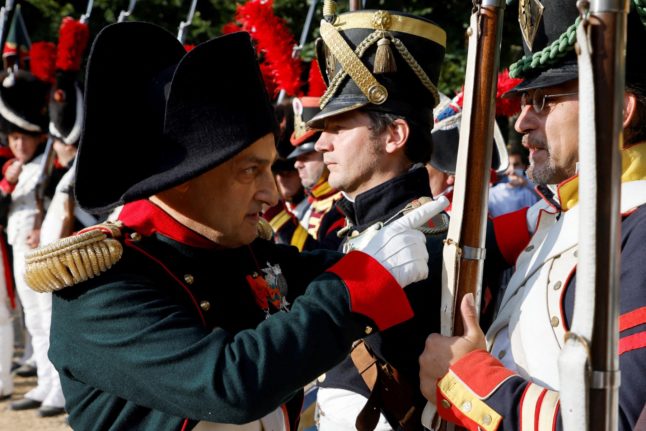Ridley Scott’s new film, Napoleon, focuses on the meteoric rise of Napoleon Bonaparte – a ruthless military commander who rose from humble beginnings in Corsica to become Emperor of France in 1804.
At the height of his power, Napoleon exerted power over vast swathes of territory in Europe, the Americas, Africa and Asia.
Napoleon was a military genius and a pioneer of artillery, defying the odds to achieve victory in close to 90 percent of all his major battles.
When his arch-nemesis, the Duke of Wellington, was asked to name the greatest general of the era, the reply came: “in this age, in past ages, in any age, Napoleon.”
Given his military prowess, it is no surprise that Napoleon is often overlooked as a leader with an almost poetic mastery of the French language. Here is our selection of some of the most erudite phrases every to spill from the Corsican’s quill – or to be uttered in his thick provincial accent.
Love
Some of Napoleon’s most romantic lines come from letters to his wife, Josephine, invariably sent from the front-lines of far-flung battlefields. Among them:
- Mon bonheur est que tu sois heureuse, ma joie que tu sois joyeuse – ‘My happiness is that you are happy, my joy is that you are joyful’
- La terre n’est belle à mes yeux que parce que tu l’habites – ‘The earth is only beautiful to me because you live on it’
READ MORE: 6 myths about French emperor Napoleon
The French Emperor eventually divorced Josephine but that didn’t stop him from philosophising more generally about love, as these lines commonly attributed to him attest.
- L’amour est une sottise faite à deux – ‘Love is foolishness shared between two people’
- Une belle femme plaît aux yeux, une bonne femme plaît au coeur; l’une est un bijou, l’autre un trésor – ‘A beautiful woman pleases the eyes, a good woman pleases the heart; one is a gem, the other is a treasure
Power and greatness
Napoleon was unashamedly conscious of his place in history and wasn’t afraid to say so. At just 22-years-old, he said this at a clearly self-referential speech in Lyon:
- Les hommes de génie sont des météores destinés à brûler pour éclairer leur siècle – ‘Men of genius are meteors destined to burn bright to illuminate their century’
He is also credited with the following meditations on greatness and power:
- Ce que je cherche avant tout, c’est la grandeur: ce qui est grand est toujours beau – ‘What I’m looking for above all is greatness: what is great is always beautiful’
- C’est le succès qui fait les grands hommes – ‘Success is what makes great men’
- On gouverne mieux les hommes par leurs vices que par leurs vertus – ‘Men are better governed by their vices than their virtues’
Life hacks
While it might seem anachronistic to attribute life-hacks to a 18/19th century military leader, there are certainly a few relatable one-liners attributed to Napoleon that would still hold up on cheesy instagram influencer pages today:
- Le meilleur moyen de tenir sa parole est de ne jamais la donner – ‘The best way to keep your word is never to give it [in the first place]
- Il faut toujours se réserver le droit de rire le lendemain de ses idées de la veille – ‘You should always reserve the right to laugh the next day to laugh at ideas you had the day before’
- N’interrompez jamais un ennemi qui est en train de faire un erreur – ‘Never interrupt an enemy that is making a mistake’
Philosophy
We know from his writings and transcripts of his speeches that Napoleon believed in the importance of family and religion in a way that was typical of his time.
- L’avenir d’un enfant est l’oeuvre de sa mère – ‘The future of a child is the work of it’s mother’
- Une société sans religion est comme un vaisseau sans boussole – ‘A society without religion is like a ship without a compass’
READ MORE: 5 things you didn’t know about Napoleon
He is also credited with the following line about aging:
- Plus on est grand et moins on doit avoir de volonté ; l’on dépend des événements et des circonstances – ‘The older you get, the less you need willpower; you depend on events and circumstances’
The French
When exiled by the British to the Atlantic island of Saint-Helena, Napoleon had plenty of time to write. Among the most memorable of lines is one that many foreign residents of France will identify with today:
- Il est dans le caractère français d’exagérer, de se plaindre et de tout défigurer dès qu’on est mécontent – ‘It is in the French character to exaggerate, complain and twist everything as soon as they are discontent’
But as you would expect from the leader of the mighty French Empire, he didn’t spend the whole time bashing his subjects, as this line from a rousing speech given to soldiers on their way to fight in Spain:
- Impossible n’est pas français – ‘Impossible is not French’
One constant in Napoleon’s life was his disdain for the British – historic enemies of the French. He is reported to have said this, while exiled on Saint-Helena.
- Chaque vent qui souffle d’Angleterre ne m’apporte que haine ou outrage – ‘Every wind that blows from England brings me nothing but hatred and outrage’



 Please whitelist us to continue reading.
Please whitelist us to continue reading.
Member comments